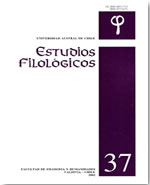Writing the City and Generating Historical Myth as the Base for Establishing a Nation: The Literary Movement of 1842
Main Article Content
Abstract
In 1840, Chilean intellectuals began to develop and consolidate ways of thinking about themselves as important and key players in the organization of the State because they have the possibility of create an imaginary community. Thanks to the presence of Andrés Bello, Domingo Faustino Sarmiento and José Mora. These writers came to Chile after escaping dictatorships in their own countries, so they attempted to create a State based on models which reflect their conception of power. It is a process of modernity that tries to generate a language which reflects the ideals of citizenship, homeland, nation and writing. In this work I would like to examine just how the discursive project of the intellectual of 1842 worked.
Article Details
How to Cite
Figueroa, A. (2018). Writing the City and Generating Historical Myth as the Base for Establishing a Nation: The Literary Movement of 1842. Estudios Filológicos, (37), 211–224. https://doi.org/10.4067/S0071-17132002003700013
Issue
Section
Artículos

